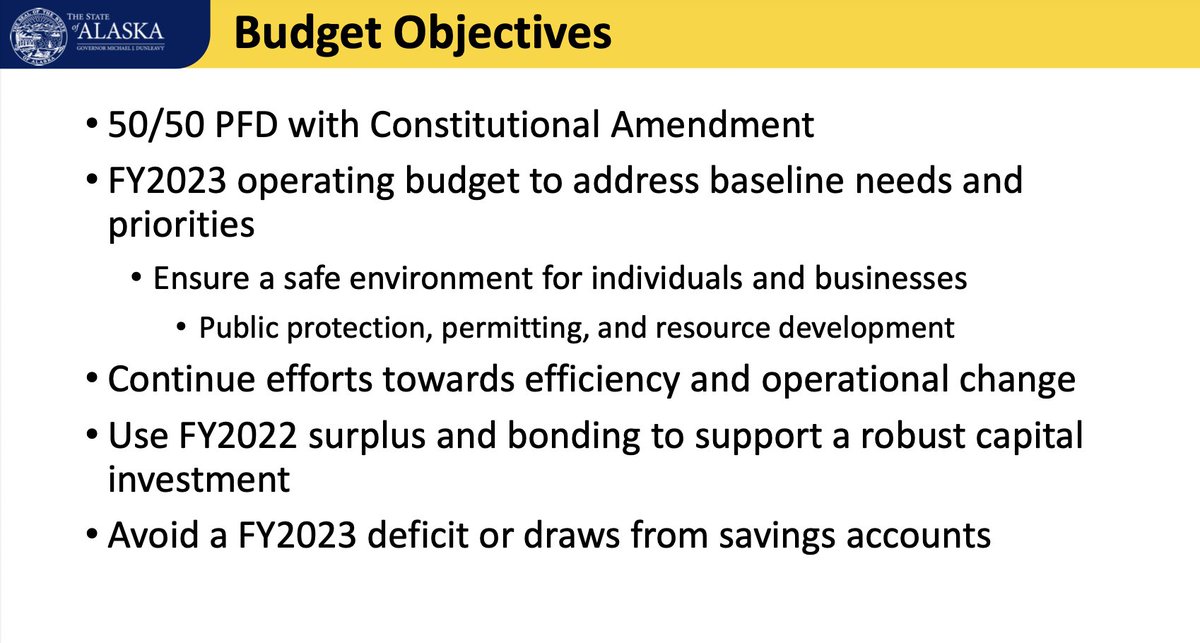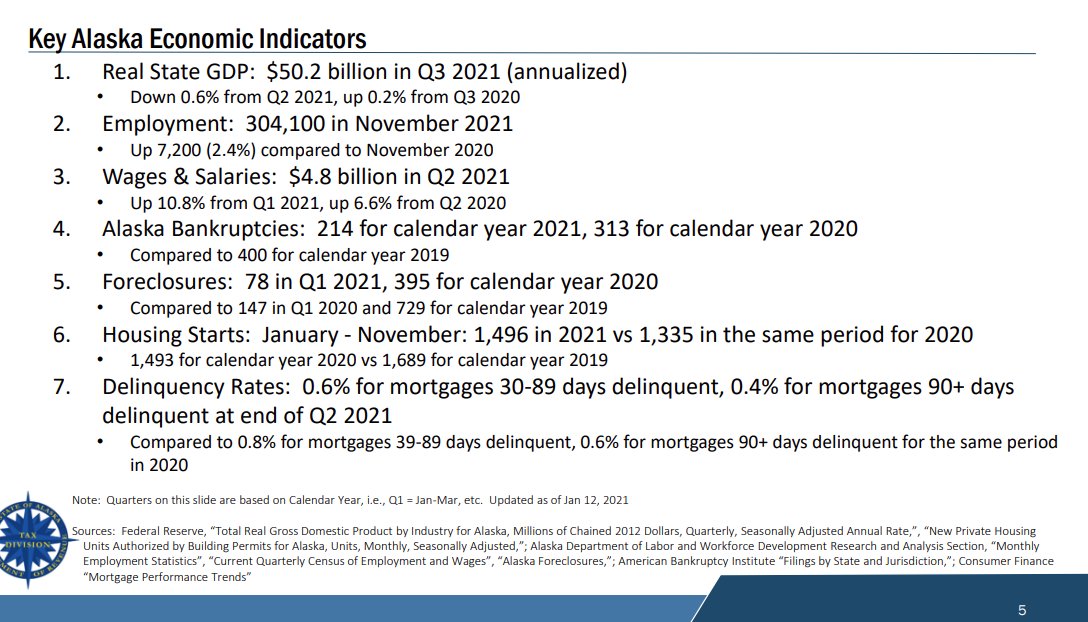
The House Finance Committee is underway with an overview hearing on Gov. Dunleavy's budget proposal.
#akleg
Watch: akleg.gov/includes/_play…
Presentation: akleg.gov/basis/get_docu…
#akleg
Watch: akleg.gov/includes/_play…
Presentation: akleg.gov/basis/get_docu…

Steininger explaining how the state's budget has been reduced by ~5% since Dunleavy took office with most of the cuts coming to the University of Alaska and a few other areas. Notes quite a bit of it, though, has been eaten up by more spending on public safety, corrections. 

Rep. Foster asks why Steininger chose FY19 as the starting point, asking whether it's intended to make the budget look better.
Steininger says it's to "focus on the achievements of this administration."
Steininger says it's to "focus on the achievements of this administration."
Rep. Foster notes that the governor's "balanced" budget is balanced with one-time federal money. Steininger says yep.
Here's the governor's budget objectives: PFDs, troopers, permitting, resource development, government efficiencies. 

Rep. Ortiz asks whether the $1.25B of federal money the Dunleavy is using in the budget is one-time money or continuing. Steininger says it's one-time money.
One of the budget issues that hasn't got much attention is the state's plans to reduce spending on retirement. They've cited good returns for those investments.
Legislators are wary. Rep. Josephson notes the retirement budget has been a huge deal. Requests prentation on it.
Legislators are wary. Rep. Josephson notes the retirement budget has been a huge deal. Requests prentation on it.

Rep. Foster comes back around to the inclusion of some $300+ million in one-time federal money as concerning.
Rep. Edgmon: "I guess dreams do come true." When it comes to big PFD, etc.
"We're building a budget on build it and they will come. I don't view this as a budget that spends money we don't have yet."
"We're building a budget on build it and they will come. I don't view this as a budget that spends money we don't have yet."
Rep. Edgmon: "We don't take a dime out of savings, but we also don't put a dime back into savings either."
He says it's not particularly fiscally conservative, compares it to spending based on good fish forecasts. The money isn't in hand, they only THINK it'll be on hand.
He says it's not particularly fiscally conservative, compares it to spending based on good fish forecasts. The money isn't in hand, they only THINK it'll be on hand.
Steininger responds by noting that the budget is based on the fall revenue forecast, as it has traditionally been built. (They're also updating the forecast monthly, now, to get in on improving oil prices)
Edgmon: "If oil prices plummet to $40 this fall, what do we do? I have to think about that."
He also contends that it's not "normal" to swap in $350M in one-time federal money to cover reoccurring costs. What happens after the money runs dry?
He also contends that it's not "normal" to swap in $350M in one-time federal money to cover reoccurring costs. What happens after the money runs dry?
Steininger says the federal money is there. Why not spend it?
He says using the money allows the state to avoid a draw on its savings accounts.
He says using the money allows the state to avoid a draw on its savings accounts.
Edgmon: "What happens if the bottom falls out? I have to think about that. I've yet to see a governor's budget that doesn't have just a little bit of aspiration built into it. This one definitely has that."
Rep. Rasmussen asks why wouldn't the state spend the federal money? "Alaskans may need additional help this year."
Important to note, though, that Dunleavy's proposing to use the fed money to cover reoccurring expenses, not any notable relief programs.
Important to note, though, that Dunleavy's proposing to use the fed money to cover reoccurring expenses, not any notable relief programs.
Addressing the concerns about the access to savings for if the bottom falls out, Rep. Rasmussen notes that they can always dip into the Alaska Permanent Fund: "I think it's disingenuous to say we don't have money ... if something bad were to happen. The sky wouldn't fall."
Rep. Rasmussen is back in Dunleavy camp. She says she appreciates his budget and hopes the Legislature will work with him on it.
Rep. Foster gives an analogy of using your savings to cover lost wages and claiming your budget is balanced but having no plan to address the underlying problem: "We have to be careful to not use one-time covid money to cover ongoing operating expenses."
Rep. Josephson says the budget is just getting the state through one year. What happens into the future?
Steininger: "There's a deficit." He says they hope it will eventually shrink and become a surplus (assuming govt. growth is 1.5% or less). "There's a lot of assumptions."
Steininger: "There's a deficit." He says they hope it will eventually shrink and become a surplus (assuming govt. growth is 1.5% or less). "There's a lot of assumptions."
Rep. Johnson says the budget is pretty great and even reaches across the aisle: "It's a masterful work."
Again, the concern with the budget isn't so much what it does in this year but what it does for future years.
Rep. Ortiz notes there's also a general obligation bond package that would incur further debt for the state's infrastructure package. Ortiz wonders if it'd be more prudent to use the one-time money for these projects rather than take on long-term debt.
Steinigner says with the low interest rates, the state would be remiss not to take on additional debt.
Rep. Edgmon says he's keen to put more money into savings, fully aware "there are some in this room and outside this room spend every single dime, and maybe even more."
Rep. Foster says he agrees with it.
Rep. Foster says he agrees with it.
Under the new budget, Steininger says, the feds will cover all but $5 million of the cost to run the state ferry system over the next 5 years ($60M). There's $200M total available each year with Alaska one of the two competing states.
On the Medicaid budget, Steininger says the plan is to transition people off the program to "other sources of getting their health care needs."
Back onto the ferry system, Steininger notes that the federal money means the receipts from the ferry system can be spent elsewhere or maybe saved.
Steininger says the federal money will allow the ferry system to run a more "maximized" schedule. Says they won't have to tie up vessels just to save money, as they've been doing for the last several years.
Rep. LeBon: Where will the 15 new trooper positions be put?
Steinginger: Primarily the Mat-Su Valley.
LeBon: Is the Mat-Su experiencing a crime wave where they need 15 new troopers?
Steinginger: Primarily the Mat-Su Valley.
LeBon: Is the Mat-Su experiencing a crime wave where they need 15 new troopers?
Rep. LeBon says he thought they were supposed to be more of a rapid response unit to address needs in rural Alaska.
Steininger says the 15 new troopers for Mat-Su is intended to hire up quickly as possible.
LeBon notes they still have bunch of hiring and retainment problems.
Steininger says the 15 new troopers for Mat-Su is intended to hire up quickly as possible.
LeBon notes they still have bunch of hiring and retainment problems.
Rep. Edgmon asks where the tribal liaisons be placed? He says he understands one will be in the governor's office.
Steininger says yeah, but maybe other places, too.
Steininger says yeah, but maybe other places, too.
And compare that "People's First Initiative" to the $10M Dunleavy's requesting to sue the federal government over the Clean Water Act, etc and "statehood defense efforts." 

Edgmon goes back and forth with Steininger over the income federal infrastructure funding. There's a tepid overture to including legislators on it.
Edgmon says it's "dramatically underwhelming" that there it is not a "bigger deal during the Legislature at this point."
Edgmon says it's "dramatically underwhelming" that there it is not a "bigger deal during the Legislature at this point."
• • •
Missing some Tweet in this thread? You can try to
force a refresh










